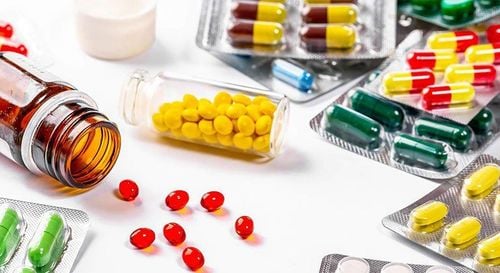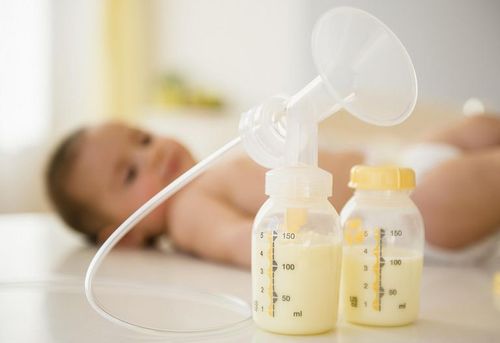This is an automatically translated article.
Breastfeeding is the optimal form of infant nutrition in the first few months of life. However, women who are taking medication may be concerned because they fear that the child may be exposed to the drug that is excreted in breast milk and harms the baby. Therefore, an understanding of drug use during lactation and the health of the infant, which drugs are excreted in breast milk, and the determinants of treatment, both help achieve a cure for the mother's disease. , while helping to fulfill the sacred task.
1. How are drugs and breast milk related?
Breast milk is best for babies is a widely accepted concept. These benefits are significant for the baby, providing ideally balanced nutrition, antibodies to protect against disease and a healthy weight. Breastfeeding also offers benefits to the mother, such as increased bonding and relaxation, which can save costs and also reduces the risk of breast and ovarian cancer.
Most experts recommend exclusive breastfeeding for at least 6 months and up to 12 months while babies begin to eat solid foods. However, many mothers will need to take certain medications while breastfeeding, whether it's short-term for acute conditions like back pain or runny nose, or longer-lasting for a chronic illness. such as high blood pressure and diabetes.
This may raise questions about the safety of the drug and breast milk. Although the patient is a new mother with new responsibilities, it is her own health that really matters.
Although many drugs are safe to take while breastfeeding, most are excreted in breast milk to some degree. To be on the safe side, consult your doctor before taking any prescription or over-the-counter medications, herbs or supplements, or vitamins. Even herbal teas can contain ephedra or other harmful ingredients when breastfeeding.
2. What drugs secreted in breast milk can be used during breastfeeding?
Medicines that are excreted in breast milk that can be used while breastfeeding include:
Painkillers paracetamol. Ask your doctor before taking other pain relievers, such as ibuprofen; Most antibiotics; Asthma inhalers; Vitamins (but only in recommended doses); Furthermore, the mother can also have dental treatment, local anesthesia, vaccinations (including MMR, tetanus and flu) and perform most surgeries while breastfeeding.

Mặc dù nhiều loại thuốc an toàn để sử dụng khi đang cho con bú nhưng hầu hết thuốc bài tiết qua sữa mẹ ở một mức độ nào đó
3. What drugs secreted in breast milk cannot be used during breastfeeding?
Common drugs that are excreted in breast milk that are not recommended while breastfeeding include:
Codeine; Decongestants in the form of tablets, liquid or powder; some decongestants in the form of sprays or drops; Aspirin for pain relief; Herbal remedies - not enough is known about herbal remedies to make sure they are safe while breastfeeding; Antihistamines – talk to your doctor about taking antihistamines to treat allergies or allergy-related conditions, such as hay fever.
4. Things to keep in mind when taking medicine while breastfeeding
It is true that many of the effects of drugs excreted in breast milk on the nursing infant are not known. Therefore, it should only be taken with the doctor's prescription, with the lowest dose and for the shortest time while still ensuring the treatment effect.
When possible, the number of times the drug is excreted into breast milk is only once per day immediately after breastfeeding. This will give your baby the longest time without feeding. For most mothers, the chosen time will be the last feeding of the night, before the baby goes to bed.
Monitor the baby for adverse effects of drugs excreted in breast milk such as drowsiness, irritability, other known or potential drug reactions.
Avoid the use of long-acting (LA), extended-release (ER) and combined formulations of drugs that are excreted in human milk. Instead, short-acting drugs are cleared from the body more quickly, and single drugs offer more flexibility in dosing.
For premature (premature) infants, because their size and organ systems are less developed than full-term infants, medications and breast milk require more special consideration. In some cases, infant formula can be selected temporarily during the mother's treatment.
Careful consultation with your doctor about the risks and benefits of any medication prescribed while breastfeeding or any over-the-counter medication, especially anti-inflammatory drugs, is necessary. secreted into breast milk.
If more than one drug or a combination of drugs is required, follow lactation recommendations for the drug excreted in breast milk that poses the greatest risk to a nursing infant.
In summary, most drugs can be used in nursing women without harm to the baby. Although small amounts of any medication you are taking can pass through breast milk to your baby, although there are very few medications that are unsafe while breastfeeding, it's still best to consult your doctor before using a product. any medicine, in order to ensure the health of the mother but still ensure an absolutely safe source of nutrition for the baby in the first few months.
Please dial HOTLINE for more information or register for an appointment HERE. Download MyVinmec app to make appointments faster and to manage your bookings easily.
Reference source: nhs.uk












